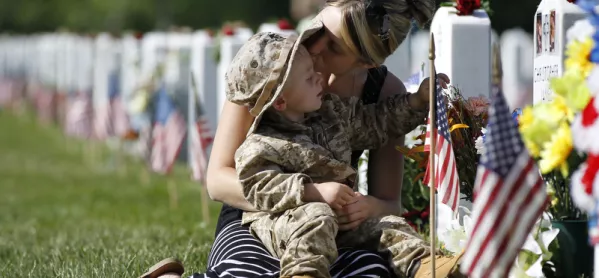- Home
- How to help grieving students on Memorial Day and everyday
How to help grieving students on Memorial Day and everyday

Now is an opportune time for school professionals to think about providing support to children who have lost a parent, sibling or other close family member serving in the military. These children will be thinking of their loved one, even if the death occurred some time ago. So will children with a parent going through a long or repeat deployment, or families watching a loved one recovering from a serious emotional and/or physical combat injury.
In most ways, the process of grief and remembrance will be similar to that of children who have lost loved ones in other ways.
Ready to Protect
It is understood that service members stand ready to protect our nation, whatever the risk. Combat deaths are often seen as heroic and noble. Children and families believe they are expected to respond to a loved one’s combat death with strength, courage and grace.
Often, however, children feel confusion, anger, resentment and other difficult emotions. “Why did my dad have to die serving his country? I want him here with me!” “Why couldn’t someone else have died? I want my mom back.”
Children may feel guilt or shame about these reactions. They may be unable to express the painful and complex emotions they’re having. They may believe they should curtail their emotions. This interferes with their ability to fully experience their grief and, over time, move forward in their lives.
Addressing the Emotion of Grief
Grief is an emotion that all of us will experience at some point in our lives. Research shows that seven out of 10 teachers have a student affected by loss in their classroom. The challenges associated with grief can lead to missed school days, a loss of concentration, and falling behind in school work. Despite this, schools often fail to properly assist grieving students.
A compassionate response and a supportive environment for students to express and work through their grief can go a long way in preventing long-term damage to the student’s educational progress and enhancing their social and emotional well-being. According to the National Association of School Psychologists, students who receive social-emotional support and prevention services achieve better academically in school. This is particularly important when a child is experiencing grief or the anniversary of a traumatic event or loved one’s death. Schools can support students’ social and emotional development as part of a comprehensive approach to a positive school climate.
“A growing body of research shows that when schools attend to students’ psychological, social, and emotional development alongside academic learning, student engagement and academic achievement improve,” states Stanford Researcher, MarYam G.Hamedani. According to her study of Social Emotional Learning (SEL) programs, successful schools integrate SEL into all aspects of school life to educate the “whole student,” creating climates, norms, and expectations that place students’ psychological needs on par with their academic needs. Furthermore, these schools also prioritize the social and emotional needs of school staff to equip them with the skills and resources necessary to support their students’ social and emotional growth. Every adult in the school building can play a role in this supportive environment.
Support Grieving Children
School professionals can take steps to support children who have lost a family member in combat or are experiencing grief for other reasons.
- Touch base. Let children in military families, those who have lost a loved one in combat, or others experiencing grief know you’re thinking of them. Ask how they’re doing.
- Create a supportive culture among peers. Take steps proactively to help students understand and talk about death. Offer guidance on how to support a peer who has experienced a loss.
- Support children in their process of bereavement. Ask them to share memories of their loved one or talk about the deceased’s positive traits and behaviors. Ask about positive traits they share. Have them describe friends and family who have been supportive.
Providing support for children and families in these ways is one of the most meaningful ways for school professionals to support children and remember those who served our country, on Memorial Day and every day.
This article was produced by NEA Healthy Futures in conjunction with the Coalition to Support Grieving Students to also provide a website of resources for school personnel to meet the needs of grieving school children. Dr. Tom Demaria received his Ph.D. in Clinical/School Psychology from Hofstra University in 1986 and has been a New York State licensed Psychologist since 1987.
Want to keep up with the latest education news and opinion? Follow TES USA on Twitter and like TES USA on Facebook.
Keep reading for just £1 per month
You've reached your limit of free articles this month. Subscribe for £1 per month for three months and get:
- Unlimited access to all Tes magazine content
- Exclusive subscriber-only stories
- Award-winning email newsletters